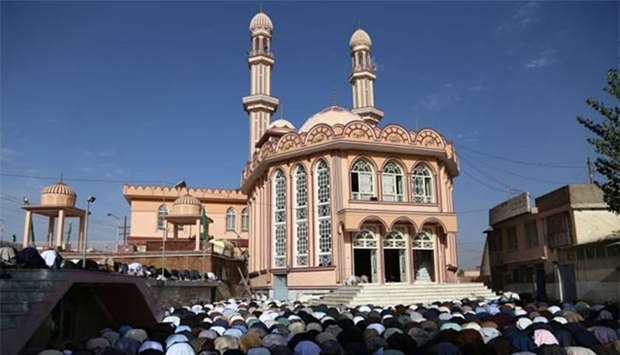Afghanistan celebrated the annual Eid al-Adha holiday on Friday with animal sacrifices and calls for peace and an appeal by the president for insurgent groups to lay down their arms and open talks with the government.
The second of two annual Eid celebrations, Eid al-Adha is being celebrated in a mood of apprehension in the capital, Kabul, following a string of suicide attacks that have killed more than 200 people since the beginning of the year.Eid al-Adha is held at the end of the yearly Haj pilgrimage and marks Abraham's willingness to sacrifice his own son to God. Traditionally marked by the slaughter of animals, whose meat is shared with family members and the poor, it is also known as the Feast of Sacrifice.
"I've come here to sacrifice a sheep for the sake of God," said Ahmad Parwiz, a Kabul resident standing at a roadside market as butchers cut the throats of cows, sheep and goats brought in for slaughter.
"This is a religious custom of our Islamic religion and everyone who is wealthy can sacrifice a sheep or other animals for the sake of God on this day," he said.
In his celebration address, President Ashraf Ghani called on the Taliban, who have been fighting to drive out international forces backing the government and restore strict Islamic rule to Afghanistan, to accept peace.
"It is time for the armed opposition of Afghanistan to choose whether they are fed on the milk of the mothers of this country, and are inspired by this nation, or whether they are the tools for disunity, chaos, used by outsiders," he said.
In an earlier message, Taliban leader Mullah Haibatullah Akhunzada said peace could come once foreign forces left Afghanistan and called on business to invest to strengthen the country and aid groups to continue their work.
"The main obstacle in the way of peace is the occupation. A peaceful solution of the Afghan issue is the main pillar of the policy of the Islamic Emirate, should the occupation come to an end," he said.
At the marketplace, people whose lives have been shaped by four decades of war, were still waiting.
"I want peace and security," said Mohammad Dawood. "We want a peaceful country."

